AAATA OKs Capital Program, Paratransit Deal
Ann Arbor Area Transportation Authority board meeting (Dec. 19, 2013): The last meeting of the year was attended by just five of the nine board members who are appointed and serving – and one needed to depart early. So to maintain a quorum, the meeting went by brisker than most. Even with a staff presentation on the capital and categorical grant program, the meeting concluded after about 45 minutes.
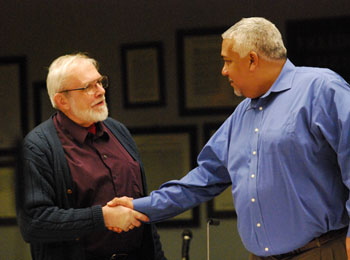
From left: Larry Krieg, Ann Arbor Area Transportation Authority’s newest board member, pending confirmation by the Ypsilanti Township board of trustees, and Eric Mahler, AAATA board member. (Photos by the writer.)
That capital and categorical grant program got a unanimous vote of approval at the Dec. 19 meeting. It’s a plan for spending about $45 million in federal funds over the next five years. According to the AAATA, this year’s plan does not include additional capital needs that would be associated with a five-year service improvement plan in the urban core, or any funding associated with rail initiatives. Having in place such a capital and categorical grant program – a set of allocations for specific categories of capital expenditures – is a requirement to be eligible for federal funding. [.pdf of 2014-2018 grant program]
The five-year service improvement plan could be implemented by the AAATA with funding that will likely be sought through an additional millage sometime in 2014. That would require approval of a majority of voters in the three jurisdictions making up the AAATA – the city of Ann Arbor, the city of Ypsilanti and Ypsilanti Township. The township became a member as a result of an Ann Arbor city council vote taken on Nov. 18, 2013.
The expected appointee to the AAATA board from Ypsilanti Township, Larry Krieg, attended the Dec. 19 meeting and sat at the table, although his appointment has not yet been confirmed by the township board of trustees. His confirmation did not appear on the township board’s Dec. 9, 2013 agenda. The next township board meeting is set for Jan. 21, 2014, which comes the week after the AAATA’s next regular meeting, on Jan. 16.
So Krieg did not participate in any of the votes taken on Dec. 19.
A significant vote taken by the board was to approve a nine-month extension of a contract with SelectRide through April 30, 2015, to provide paratransit service. The value of the contract for the extension period is $2.263 million. That’s essentially a pro-rated amount of SelectRide’s current contract, which ran through July 31, 2014.
The AAATA is currently preparing a request for proposals (RFP) with an eye to overhaul the concept of its paratransit service – which comes in the context of the possible five-year service improvement plan. Without a contract extension, that RFP would need to be ready for issuance in time to complete selection of a vendor by the time SelectRide’s current contract expires in July 2014. To avoid the possibility of an interruption in service, the AAATA board approved the SelectRide contract extension.
Other business items handled by the board included contracts for snow removal and janitorial services.
AAATA 2014-18 Capital and Categorical Grant Program
The board was asked to approve the 2014-2018 capital and categorical grant program – a plan for spending federal funds. According to the AAATA, this year’s plan does not include additional capital needs that would be associated with a five-year service improvement plan in the urban core. [.pdf of 2014-2018 grant program] [.pdf of Dec. 10, 2013 planning and development committee presentation]
That five-year service improvement plan – also called the urban core expansion program – could be implemented by the AAATA with funding that will likely be sought through an additional millage sometime in 2014. A millage would require approval of a majority of voters in the three jurisdictions making up the AAATA – the city of Ann Arbor, the city of Ypsilanti and Ypsilanti Township.
Having in place such a capital and categorical grant program – a set of allocations for specific categories of capital expenditures – is a requirement to be eligible for federal funding. This year’s plan outlines how roughly $45 million would be spent over the next five years.
Among the items that AAATA manager of service development Chris White characterized during the board meeting as departing from “business as usual” were the following highlights from the program:
- purchase of small buses for paratransit services
- construction of a “superstop” on Washtenaw Avenue
- increase in funding for on-board systems for fixed-route and paratransit
- a change in the number of vans per year for vanpool services
- spreading out the replacement of the 19 2003 buses over four years
- purchase of management software and business intelligence software
- planning for projects like the connector, a possible high-capacity service for the corridor running from US-23 and Plymouth southward along Plymouth to State Street and further south to I-94
In last year’s program, no funds were programmed for dedicated park-and-ride lots. Based on minutes from the Jan. 10, 2013 meeting of the board’s planning and development committee, the lack of funding for park-and-ride lots drew concern from AATA board member Eli Cooper, who is also the transportation program manager for the city of Ann Arbor. In this year’s plan, $250,000 is designated for park-and-ride facilities in each of the first three years of the program.
The submission of the capital and categorical grant program is due to the Michigan Dept. of Transportation by Feb. 1, 2014. Annual approval of the AAATA’s capital and categorical grant program has typically taken place in January of each year, but the need to allow time for review by the newly established southeast Michigan Regional Transit Authority (RTA) has moved up the timeline to December.
Capital and Categorical Grant Program: Presentation
At the Dec. 19 meeting, AAATA manager of service development Chris White was invited to come to the podium and to give an overview of the capital and categorical grant program.
“It’s quite a lot of money,” White said, and it’s important to have some understanding of the basis for the program so that board members feel comfortable supporting it.
He began with some background on the total grant funding approval for past fiscal years. There’s a fair amount of variation, he noted – from $6 million to $20 million.
The big spikes in 2007 and 2012, he said, are bus purchases. That’s the biggest purchase the AAATA makes with grant funds, he noted. Federal grants come in “two flavors,” he continued: formula funds and discretionary funds. The formula funds are awarded based simply on formula. The really important aspect of formula funding, he said, is that the AAATA is allowed to save that money for a couple of years to plan for its use. So the AAATA is able to ration out those grant funds to take care of the authority’s needs.
Discretionary funds are significantly different from that, White explained. Typically, discretionary funds are awarded on the basis of a competitive application and are typically only capital funding. The amount of discretionary funding can vary from year to year as the programming varies year to year. What has had a significant impact on discretionary funds is the new federal authorizing legislation (MAP-21), which eliminated almost all of the bus discretionary funds, White said. Congress wanted to take away all the “discretion” associated with those funds.
Many transit agencies use discretionary funding as their primary means of bus replacement, White said. There’s been a fair amount of hue and cry from the transit industry, he added, but at this point it’s hard to tell if something is going to get changed. Right now, White said, there’s no discretionary money available.
White pointed out the variation in the discretionary funding levels over the last several years. The AAATA had been pretty successful in obtaining discretionary funding, he said.
White explained that the AAATA is able to choose the balance in formula funds, within certain limitations, between operating and capital expenses. So the AAATA wants to make sure that it has money for replacement capital – in particular replacement buses. Replacing buses has always been a top priority, White said. That has to be balanced against operating needs, White continued.
Discretionary funds are used to supplement formula funds to carry out planned projects, White said. The AAATA has resisted the urge to “chase” money – it doesn’t develop programs just because there’s money available. Instead, the AAATA tries to develop a program and then check to see if there is discretionary federal money available to support that program.
White characterized the operating expense portion of the formula funds as relatively consistent from year to year – until 2013. The AAATA was averaging a little over $2 million a year in operating funding from the formula funds, but that had been increased to over $3 million in 2013. That reflects a decision to fund increased service – on Route #4 in particular, White said.
White continued by explaining that the federal funding allocation has a couple of different sources. He noted that 2009 was a big anomaly, because a lot of money had come in under the American Recovery and Reinvestment Act of 2009 (ARRA) – the federal stimulus act. The AAATA had used ARRA funds to build the Plymouth Road park-and-ride lot, the AAATA’s portion of the University Michigan central campus center stop, as well as the bus storage facility expansion. ARRA had been “a nice shot of money,” White said, but the AAATA knew at that point that it would not continue.
What will continue, White noted, was a new category of formula funds that the Congress had created in 2013 – Section 5339 funds. It’s for capital only, he explained. It’s meant to be a replacement for discretionary funds, but it’s a lot less money, he said.
White explained the federal formula as follows. Congress makes an annual allocation, and then it’s divided up according to a formula. Half of the formula is based on population and population density – so it’s a relatively constant figure, he said. The other half is based on how much service is provided and how much service gets consumed. Miles of service is a much bigger factor, he said, than passenger miles. The AAATA can actually calculate how much in federal formula funds would be generated by a new service, White said.
The service that the University of Michigan provides is considered a public transit service. So the AAATA had begun working with UM a number of years ago, he said, to start filing a report to the feds that brings in some additional federal funds to Ann Arbor’s urbanized area. Under the M-Ride agreement with UM, White explained, those federal funds are committed to helping to pay for that agreement.
White noted that the AAATA had started a van pool program a couple of year ago – and he explained that van pool miles also count as a part of the federal formula. Those passenger miles from the van pool bring in enough money from the federal formula funds to pay for the vans, he said. So the vans are not having local money spent on them, White said – because it’s being funded through the formula funds and the riders.
White laid out how much federal formula money is generated by the UM bus operation – which is a little over $1 million. It had increased a bit last year, due to an increase in the UM bus operation as well as the formula, he said. Using that money to fund the M-Ride agreement reduces the amount that the University of Michigan pays in cash, White said. The federal money generated by UM is applied to “operating assistance,” White explained.
The five-year capital and categorical grant program includes both the capital and the operating funds that are used by the AAATA. So the authority doesn’t have a capital program by itself – because those funds are interchangeable, and the AAATA needs to plan for both the capital and the operating part of the funds. The current program was adopted in January 2013, he noted, to form the basis for the federal application last year as well as for state funding. The program the board was being asked to authorize, White said, would form the basis of the 2014 federal application and for the 2015 state application. It must also be reviewed by the southeast Michigan Regional Transit Authority (RTA).
White said it’s important to emphasize the fact that this year’s program does not include any capital or operating funds for the urban core service expansion. It does not include any money for operating expenses for that possible expansion or for money to purchase additional buses, White said. It also doesn’t include any money for rail service or service that operates outside of the immediate area, White explained, saying he wanted to dispel any rumors along those lines.
White highlighted some substantial changes in this year’s program, saying it’s “not quite business-as-usual.” The big changes include the fact that the AAATA is looking to buy some small buses. That’s related to the SelectRide paratransit contract extension that was on the board’s agenda that night, White said. The AAATA would be buying buses (e.g., wheelchair lift-equipped vehicles) rather than having the contractor provide those vehicles as part of the contract. The effect of that would be to shift the expenditure from operating expenses (paying for the vehicles through the paratransit contract with a third-party vendor) to a capital expense.
The van pool purchases have changed significantly, White continued. The AAATA’s approach had initially been simply to program 25 vans a year. Now the program is based on actual replacement and what’s expected from expansion. The van purchase has turned into a much more definite program, he concluded.
The third departure from business as usual involved operating assistance. The feds have given transit agencies the ability to apply directly for operating assistance for the first time in about 20 years, White said. It’s advantageous to use the formula funds for straight operating assistance rather than for preventive maintenance, he said.
The AAATA is looking to construct one superstop on Washtenaw Avenue, White said, as a part of the Reimagine Washtenaw project. The AAATA wants to demonstrate what that would look like, and would look for different funds to construct the remaining superstops on Washtenaw Avenue. Constructing one superstop would be a way to jump start things by demonstrating the concept, White said.
There’s about $3 million in the capital and categorical grant program that’s supposed to go toward “onboard systems.” TransitMaster, which is the brand name of the AAATA “advanced operating system,” was cutting edge in 1997, White said. He reported that 16 years ago, the AAATA was the first transit agency in the country to have unified operating software. But it’s now 16 years old, he noted. So there’s a decision to make about upgrading that existing system or soliciting bids for a different kind of software. The money is included in the capital and categorical grant program to “make sure we’ve got it if we need it,” White said.
Of the buses acquired in 2003, 19 are eligible to be replaced in 2015, White said. Rather than do that all in one year, the AAATA would rather spread that out over four years. Finally, there are funds that would allow the purchase of management “business intelligence” software.
Capital and Categorical Grant Program: Board Questions
Board member Eric Mahler picked up on this remark of White’s during question time, asking, “If preventive maintenance is not an operating cost, what is it?” White allowed that preventive maintenance is, in fact, an operating cost. White explained that when the AAATA gets preventive maintenance funds from the federal government, the feds pay 80% and the state provides a 20% match. But that becomes an eligible expense for state operating assistance, White said. So if the AAATA receives $800,000 for preventive maintenance, and the state provides $200,000, that’s $1 million total for preventive. And that $1 million would then be ineligible for state operating assistance.
So the AAATA would lose about $300,000 in state operating assistance on that approach. [The state operating assistance formula is budgeted this year at about 30.5%.] If the $800,000 is allocated by the AAATA as operating assistance – instead of preventive maintenance – then the AAATA does not get the state match ($200,000). However, it does stand to receive more money than the matching state preventive maintenance funds – through the state’s operating assistance ($300,000). So that gets the AAATA somewhat more money. Mahler chuckled and said, “That works for me!”
Asked by Jack Bernard what a superstop is, White first gave some background on Reimagine Washtenaw, which is a partnership between the city of Ann Arbor, Washtenaw County, Pittsfield Township and Ypsilanti Township.
That project is looking at the redevelopment of Washtenaw Avenue, particularly as a transit corridor. Part of that includes bus stops that are more than a pole or a shelter. It would be something that looks a lot more like a bus rapid transit (BRT) stop, White said. Some design work has been done by the consultant that the county hired to design superstops, so now the AAATA is looking to build one to show what it looks like. Bernard ventured that a superstop would not be a staffed facility, which White confirmed it would not be.
In response to a question from Larry Krieg, White explained that federal funds can only be used in the Ann Arbor urbanized area, so could not be tapped by the RTA for “existential funding.” What the RTA has discussed, White continued, is tapping some of the state operating assistance given to agencies. Right now, transit agencies are reimbursed for about 30.5% of their operating expenses by the state. There’s been a lot of resistance from transit operators in Detroit, White said, to the RTA taking some of that operating assistance to fund its administrative costs.
Following up on a question from Krieg, AAATA’s IT manager Jan Black explained that the advanced operating system takes all the data the AAATA has – GPS, fare collection, financial – and allows you to produce key performance indicators. In most cases, that information can be generated in real time. It’s valuable to be able to generate that information, so a lot of transit agencies have that software, Black concluded.
White wrapped up his presentation by going over the projected federal funds balance for each of the next five years. The $2.1 million at the end of 2018 is estimated, so the AAATA thinks that the projects it has planned can actually be paid for. He noted that the capital and categorical grant program is something that is revisited every year.
When the board reached the item on the agenda, there were no further deliberations.
Outcome: The board voted unanimously to approve the capital and categorical grant program for 2014-2018.
Paratransit
The issue of paratransit services, which the AAATA provides under the brand A-Ride through a contract with SelectRide, came up several different ways during the Dec. 19 meeting. Most obviously, this topic came up in connection with a nine-month extension for SelectRide’s contract.
But the issue was also connected to the capital and categorical grant program and the decision by the AAATA in the future to purchase small buses used to deliver the service. That makes those buses a capital expense – instead of an operating expense paid through the contract with SelectRide.
The board also received an update from the AAATA’s local advisory council (LAC), a group that provides input and feedback to AAATA on disability and senior issues.
And finally, public commentary from Thomas Partridge included a standing complaint about the quality of the A-Ride service, which he uses.
Paratransit: Background
The provision of complementary paratransit service for people with disabilities – as an alternative to fixed-route service – is a requirement of the Federal Transit Administration under the Americans with Disabilities Act. Public transportation agencies must provide special service to those with disabilities that is “comparable to the level of service provided to individuals without disabilities who use the fixed route system.”
The paratransit service is required to be offered within a corridor 3/4 mile on either side of a fixed bus route. Comparable service is defined as a demand-response service from door to destination, in which the public transit agency schedules and provides paratransit service to an eligible person for a request made the previous day. The fare that can be charged for the paratransit service can’t be more than twice what the fare would be for a similar trip taken on the fixed-route system. [.pdf of Federal Transit Administration Section 7 of Title 49 on "Transportation Services for Individuals with Disabilities"]
The AAATA fulfills its obligation under the ADA through its A-Ride program. Trips can be arranged at least one day in advance for a $3 fare, which is twice the $1.50 full fare for regular fixed-route rides. In addition, same-day trips can be arranged through A-Ride for a $4 fare. The higher fare can be charged for those trips, because they are not being offered under the ADA requirement. Some holders of A-Ride passes – who have the right to reserve rides for $3 under the A-Ride program – might also be able to ride the AAATA regular fixed-route system. If they opt to ride the fixed-route system, the A-Ride program allows them to do that without paying a fare.
Paratransit: Rethinking
Rebecca Burke gave an update from the local advisory council (LAC), a group that provides input and feedback to AAATA on disability and senior issues. Following up on her remarks was Jack Bernard, who’s acting as a liaison from the board to that group, and who has started attending its meetings.
Bernard noted that another issue the group had talked about was terminology. The group had discussed the idea of “stepping back” from using the phrase “the ADA service” and instead talking about the AAATA’s paratransit services as “the accessibility service.” By calling it the “ADA service,” it gives the false impression that the only reason the AAATA provides the service is to comport with the ADA, he noted.
Burke expressed her appreciation that the AAATA has always gone above and beyond what is necessarily required by the ADA.
And when the board reached the SelectRide contract on the agenda, Bernard said that one reason it’s important for the board to support the nine-month extension is that AAATA paratransit coordinator Brian Clouse and the other AAATA staff have put together a very robust potential overhaul of the service.
They really want to look deeply at ways the AAATA might improve its provision of the accessibility of the service, Bernard said. Putting out an RFP now would be premature, he said, because it would lock the AAATA into an agreement too soon. He called the nine-month extension a good mitigating measure – to ensure that service would not be interrupted.
Bernard said that his sense from attending the LAC meeting is that most riders are feeling good about the service and that they feel there’s a good response when there is a concern. He got the sense from AAATA staff that riders are assertive when concerns come forward. Bernard wholeheartedly supported creating an opportunity for the next RFP for paratransit service to be very forward-looking and give the AAATA the chance to do new and interesting things.
Paratransit: SelectRide Contract
The board considered a contract extension with SelectRide for nine months, through April 30, 2015. The value of the contract for the extension period is $2.263 million. That’s essentially a pro-rated amount of SelectRide’s current contract, which ran through July 31, 2014.
Just six months ago, the board had authorized the final year of a three-year contract with SelectRide – at its July 23, 2013 meeting. Board deliberations at that meeting indicated that negotiations on that $3,016,871 contract with SelectRide had been difficult, and had been completed under time pressure with no feasible alternative to SelectRide.
The contract extension comes in the context of the need to issue a request for proposals for the service, and the AAATA’s possible implementation of a five-year transit improvement plan. The AAATA is currently contemplating a substantial revision to the paratransit program and wants to take the time needed to develop a request for proposals (RFP). The AAATA wants to ensure that there’s no interruption in paratransit service.
In the context of the five-year transit improvement program that the AAATA might implement, the paratransit service would, according to the AAATA, include “later weekday service hours, later weekend service hours, and access to destinations like the Pittsfield Branch of the Ann Arbor Public Library, the Ypsilanti District Library, Meijer (Carpenter Road), Kroger (Whittaker Road), Walmart, and Quality 16 Movie Theater.”
The AAATA’s implementation of the five-year plan depends on funding that will likely be sought through an additional millage sometime in 2014, which would require approval of a majority of voters in the three jurisdictions making up the AAATA – the city of Ann Arbor, the city of Ypsilanti and Ypsilanti Township.
Paratransit: SelectRide Contract – Board Deliberations
Gillian Ream Gainsley asked if there had been any discussion at the performance monitoring and external relations committee about the quality of the paratransit service.
She noted that there’d been various concerns expressed by users of the A-Ride service. She was not sure how much of that concern was based on the performance of SelectRide as the contractor and how much was a function of the structure of the A-Ride program. Given that the same contractor would be used for nine more months, Ream Gainsley wanted to know: What has been done to address those concerns?
AAATA CEO Michael Ford noted that in the context of the most recent contract renewal, the AAATA had required some “accountabilities” – which included better on-time performance. There’s more frequent communication between the AAATA and SelectRide, Ford said, characterizing the relationship as now improved. The latest report shows that there are some accountability standards that SelectRide is meeting but also some that haven’t been met. So some of that is being addressed through “liquidated damages,” he said. Ford added that he thinks the AAATA provides a good paratransit service, but at the same time he wants to make things more streamlined and more effective for whichever contractor provides the service.
Outcome: The board voted unanimously to approve the nine-month contract extension for SelectRide to provide paratransit services.
Paratransit: LAC
Jack Bernard’s contention that when riders of the paratransit service are not satisfied, they are assertive about their complaints, has some historical merit in connection with the AAATA’s carry-on policy. Two years ago, at its Nov. 17, 2011 meeting, the board heard from a rider during public commentary who’d been denied a ride for having too many grocery bags.
And reporting out from the local advisory council at the Dec. 19 meeting, Rebecca Burke said that in reviewing the new rider’s guide, they’re trying to come up with a more concise carry-on policy for people with disabilities – so that it’s clear about how many bags can be brought aboard a vehicle and what the expectations are of each passenger.
As part of that LAC report, Burke also said the group had drafted a letter of appreciation for Gloria Kolb, who was a LAC member until recently but had to resign for personal reasons.
Paratransit: Public Commentary
During public speaking time at the end of the meeting, Thomas Partridge introduced himself as a recent candidate for public office at the state and local levels. He was there as an advocate for riders who need paratransit services that are friendly, considerate and professionally operated. He called for an end to “automatic renewal” of the paratransit contract and an overhaul to the entire system. He had arrived there at the meeting [after the public commentary at the start of the meeting had concluded] after a very disappointing experience with the A-Ride service, he said.
He’d specifically asked in his ride order for door-to-door service from a friendly, professional driver who knew how to find his address and would be driving a four-door low-bodied sedan. Instead he was picked up with a wheelchair-lift equipped vehicle, with temporary seating for ambulatory passengers – seats that are “not appropriate for persons of my height” and are difficult to cope with, Partridge said. He told the board that he was taken on a ride all over the west side of Ann Arbor before arriving at the library. He said he didn’t know if it was a “set up” or not, but he felt it had all the appearance of a “set up” – because he’d called for the replacement of Ann Arbor mayor John Hieftje, Michigan Gov. Rick Snyder and other right-wing conservatives.
Snow Removal Contracts
The board considered contracts for snow removal at five different locations.
Based on the outcome of the bidding process, Arbor Building Services of Ypsilanti will handle snow removal at the Ypsilanti Transit Center, and the Miller Road and Plymouth park-and-ride lots. The downtown Ann Arbor Blake Transit Center snow removal will be handled by A.M. Services Inc. of Ann Arbor. And when they are built, the “superstops” at Washtenaw Avenue and Pittsfield Street will be serviced by Margolis Companies of Ypsilanti.
The contracts have a one-year term with four one-year renewal options. The AAATA has spent roughly $50,000 a year on snow removal over the last five years.
Outcome: The board voted unanimously to approve the snow removal contracts.
Living Wage for AAATA Janitorial Services
The board was asked to consider a renewal of the contract for janitorial services with JNS Commercial Cleaning. The contract renewal triggered application of the AAATA’s two-and-a-half-year-old living wage policy.
The impact of the living wage policy, together with additional bi-weekly floor care services at the AAATA headquarters, will increase the annual value of the contract from $72,000 annually to $102,000. The three-year contract with JNS had already been authorized by the AAATA board at its Dec. 16, 2010 meeting, with up to two one-year renewals. However, the amount of the increase connected to the one-year extension, with a remaining one-year renewal option, is 42% – which exceeds the 10% increase threshold for board approval specified in the AAATA’s procurement policies.
The janitorial contract covers cleaning at the Blake Transit Center, the Ypsilanti Transit Center and the AAATA headquarters on South Industrial.
The AAATA’s living wage policy mirrors that of the city of Ann Arbor, which requires that contractors pay their workers at least $13.96 per hour if they don’t provide health care benefits and at least $12.52 per hour if they do provide health care benefits. The AAATA board adopted the living wage policy at its June 16, 2011 meeting.
The board did not deliberate on the item apart from a remark from Anya Dale earlier in the meeting to the effect that the application of the living wage was a good thing, because people would be getting paid what they deserved.
Outcome: The board unanimously approved the janitorial services contract.
Question of Quorum, New Member Appointment
For its Dec. 19 meeting, the board had only five of its members present – which does satisfy either of the conditions for quorum specified in the AAATA’s bylaws: “Four members of the Board, or a majority of the Board duly appointed and confirmed, constitutes a quorum.”
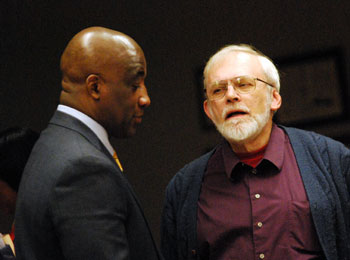
From left: Ann Arbor Area Transportation CEO Michael Ford, and Larry Krieg, AAATA’s newest board member, pending confirmation by the Ypsilanti Township board of trustees.
However, the four members specified in the bylaws date from the time before the two Ypsilanti jurisdictions (city and township) were added to the authority, and the board consisted of just seven members. The most recent change to the AAATA’s articles of incorporation specify a total of 10 members of the board – eight appointed by the city of Ann Arbor and one each by the Ypsilanti jurisdictions.
The expected appointee to the AAATA board from Ypsilanti Township, Larry Krieg, attended the Dec. 19 board meeting and sat at the table, although his appointment has not yet been confirmed by the township board of trustees. So Krieg didn’t participate in any votes. At the previous month’s AAATA board meeting, on Nov. 21, 2013, Krieg had watched from the audience and board chair Charles Griffith had noted the expected confirmation of Krieg’s appointment so that Krieg would be officially confirmed by the time of the AAATA board’s Dec. 19 meeting.
But Krieg’s confirmation did not appear on the township board’s Dec. 9, 2013 agenda. The next township board meeting is set for Jan. 21, 2014, which comes the week after the AAATA’s next regular meeting, on Jan. 16.
For the AAATA’s Dec. 19 meeting – because only 9 members of the board are appointed and confirmed – five members were sufficient for a quorum, even under the clause stating that a quorum can be “a majority of the Board duly appointed and confirmed …”
When she opened the meeting, as acting chair in place of Charles Griffith, Anya Dale noted that Larry Krieg was at the board table in an unofficial capacity, but could provide comment and insight.
As part of his report to the board, CEO Michael Ford welcomed Krieg to the board. “We’re pleased to have you here and for you to share your vast knowledge and transit experience.”
Communications, Committees, CEO, Commentary
At its Dec. 19 meeting, the board entertained various communications, including its usual reports from the performance monitoring and external relations committee, the planning and development committee, as well as from CEO Michael Ford. The board also heard commentary from the public. Here are some highlights.
Comm/Comm: Public Support for Urban Core
During public commentary at the start of the meeting, Tad Wysor addressed the board as a daily rider from Ypsilanti Township to Ann Arbor.
He said he was very pleased that Ypsilanti Township is now a part of the AAATA. He was looking forward to working with the AAATA and the other stakeholders to make the most of the new momentum. He’s working with a new group called the Washtenaw Regional Organizing Coalition (WeROC).
He said the group is hearing that regardless of how much people might use the AAATA services, they generally like the idea of improving the economy by developing as efficient and effective a transit system as possible. So he encouraged the AAATA board to keep up their good work and keep leaning on the folks in the community to understand how they can help with that.
Anya Dale responded by saying, “We’re pretty excited about that as well.”
Comm/Comm: Urban Core Financial Analysis
As a part of his report to the board, CEO Michael Ford noted that a meeting had been held the previous week on Dec. 11 with a subgroup of a financial task force that had worked on the now demised countywide effort.
That subgroup included Mary Jo Callan (director of Washtenaw County’s office of community & economic development), Bob Guenzel (former Washtenaw County administrator and current Ann Arbor Downtown Development Authority board member), Norman Herbert (retired treasurer, University of Michigan), Paul Krutko (CEO of Ann Arbor SPARK), Mark Perry (director of real estate services, Masco Corp.) and Steve Manchester (a financial advisor doing business in Ypsilanti Township). Representing the AAATA board on the subgroup will be Susan Baskett, Eli Cooper, Charles Griffith and Roger Kerson.
The next meeting of that group will be Jan. 13, 2014, Ford said. They’d be gearing up for a Jan. 23, 2014 meeting of the urban core working group at 4 p.m. at Pittsfield Township Hall.
Comm/Comm: Peer Comparisons
As a part of his report to the board, CEO Michael Ford noted that the previous meeting of the board on Nov. 21, 2013 included a report on some peer data analysis. Board member Jack Bernard had asked the staff what the staff would be doing with that information going forward and how it would inform the staff’s work.
Ford said that the AAATA is “doing fairly well, particularly with the quality and usage of our service,” but he allowed that “we can always continue to improve.” Ford said that the staff would focus in on factors that affect the cost per service hour, living wage impacts on service contracts, and aligning services to control costs and improve them. Other staff efforts will be to continue developing partnerships with stakeholders to add value, enhance ridership and conserve resources. Ford spoke of collaborating with peers to optimize work models, and to improve customer service functions, fare and fare media policies.
He concluded by saying that the AAATA offered a good quality service that’s well run and well utilized, and he wanted to ensure that the AAATA continued to provide the good quality service that meets the public’s needs.
Comm/Comm: AirRide
CEO Michael Ford also reported that the AirRide service between downtown Ann Arbor and Detroit Metro Airport had enjoyed its second highest ridership week for the week of Nov. 14 – with 1,802 rides. Last year around the same time, 1,920 trips had been taken on AirRide. Ford hoped that figure would be surpassed in December of this year.
Comm/Comm: Year-End Thanks
As part of his report to the board, CEO Michael Ford summarized 2013 by calling it a really amazing year. He thanked board members for their continued support and valuable input. Adding the two new jurisdictions to the AAATA – the city of Ypsilanti and Ypsilanti Township – was a pretty major accomplishment, he said.
Ford also thanked the AAATA staff, which provides a solid foundation, he said. The AAATA had a rock solid commitment to being the best transportation provider it can be, he said. Ford concluded by reiterating his thanks to the staff and the board, and wished everyone a happy holiday.
Comm/Comm: Fare Equity
In her report out from the planning and development committee, Sue Gott described a presentation that manager of service development Chris White had given the committee on fare equity. The committee had reviewed a draft policy that would then come back to the board in January, she said.
During public commentary at the conclusion of the meeting, Jim Mogensen said he’d try to provide some substantive comments on the service and fare equity analysis by Jan. 15, 2014. He said he hoped that he would not overwhelm the board with his commentary, but wanted to give them a heads up that it would be forthcoming.
Comm/Comm: How Need for Stops Is Determined
At the conclusion of the meeting during public commentary, Michelle Barney delivered some remarks to the board on the topic of superstops. She expressed concern that the location of such stops had been determined by the number of users – which she allowed was a fair thing to take a look at. What she did not see, however, was inclusion of the number of handicapped or differently-abled users as a factor. She felt that the AAATA would conclude that there were additional locations where a superstop with snow removal would be warranted – if the AAATA considered the number of handicapped users who board and get off the buses.
At Chidester Place in Ypsilanti, where she lives, at least 40% of the riders are differently-abled, she told the board. She complained that in seeking an application for A-Ride eligibility based on mobility limitations, she needed an eye exam – which was not the grounds for the eligibility. So she wanted the board to consider changing those criteria.
Present: Eric Mahler, Sue Gott, Anya Dale, Gillian Ream Gainsley, Jack Bernard.
Absent: Charles Griffith, Susan Baskett, Eli Cooper, Roger Kerson.
Also present: Larry Krieg, whose appointment from Ypsilanti Township to the AAATA board is still pending.
Next regular meeting: Thursday, Jan. 16, 2014 at 6:30 p.m. at the Ann Arbor District Library, 343 S. Fifth Ave., Ann Arbor. [confirm date]
The Chronicle could not survive without regular voluntary subscriptions to support our coverage of public bodies like the Ann Arbor Area Transportation Authority. Click this link for details: Subscribe to The Chronicle. And if you’re already on board The Chronicle bus, please encourage your friends, neighbors and colleagues to help support The Chronicle, too!




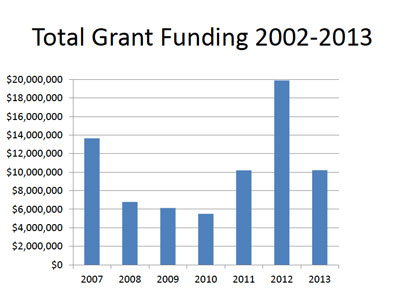
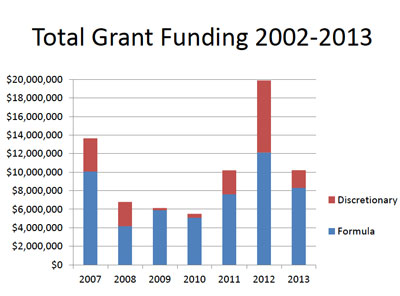
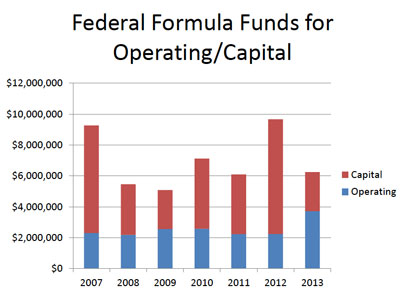
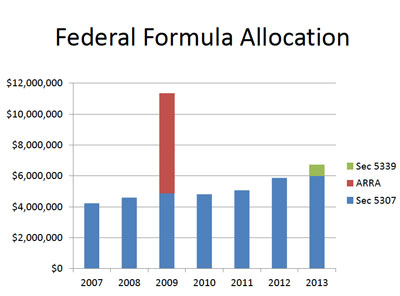
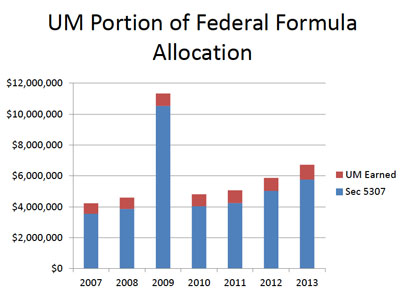
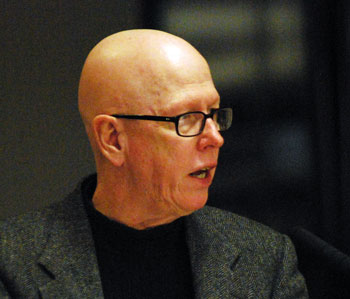
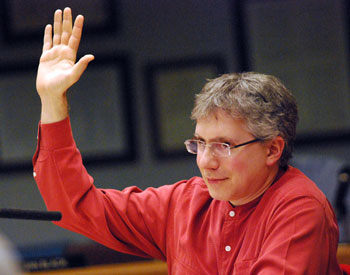

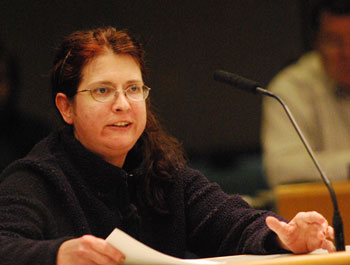
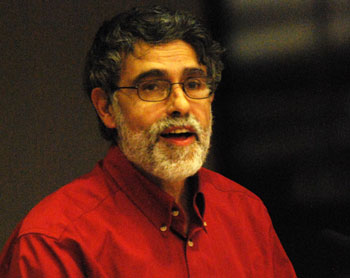
Once Larry Krieg is properly confirmed and seated, the quorum should be six members. A quorum is always the number that is a bare majority of the board. They have taken an unusual step in defining a board with an even number of members. I suppose that votes are rarely controversial, indeed almost always unanimous, so they are probably safe from difficulty.
The question will be how they rearrange the membership of the committees. Membership has been 3 in each committee (just sub-quorum) but they could now safely have more members in each committee. I’ve noticed that Gillian Ream Gainsley is now attending PDC meetings. I didn’t notice whether she actually received an appointment for that slot.